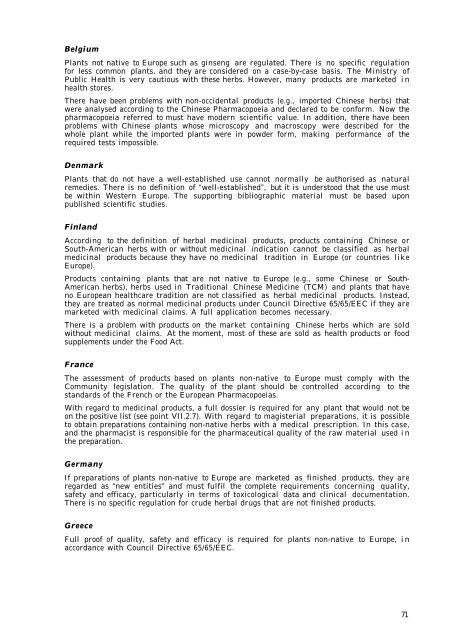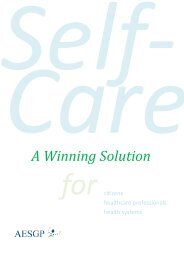Herbal medicinal products in the European Union - AESGP
Herbal medicinal products in the European Union - AESGP
Herbal medicinal products in the European Union - AESGP
You also want an ePaper? Increase the reach of your titles
YUMPU automatically turns print PDFs into web optimized ePapers that Google loves.
Belgium<br />
Plants not native to Europe such as g<strong>in</strong>seng are regulated. There is no specific regulation<br />
for less common plants, and <strong>the</strong>y are considered on a case-by-case basis. The M<strong>in</strong>istry of<br />
Public Health is very cautious with <strong>the</strong>se herbs. However, many <strong>products</strong> are marketed i n<br />
health stores.<br />
There have been problems with non-occidental <strong>products</strong> (e.g., imported Ch<strong>in</strong>ese herbs) that<br />
were analysed accord<strong>in</strong>g to <strong>the</strong> Ch<strong>in</strong>ese Pharmacopoeia and declared to be conform. Now <strong>the</strong><br />
pharmacopoeia referred to must have modern scientific value. In addition, <strong>the</strong>re have been<br />
problems with Ch<strong>in</strong>ese plants whose microscopy and macroscopy were described for <strong>the</strong><br />
whole plant while <strong>the</strong> imported plants were <strong>in</strong> powder form, mak<strong>in</strong>g performance of <strong>the</strong><br />
required tests impossible.<br />
Denmark<br />
Plants that do not have a well-established use cannot normally be authorised as natural<br />
remedies. There is no def<strong>in</strong>ition of “well-established”, but it is understood that <strong>the</strong> use must<br />
be with<strong>in</strong> Western Europe. The support<strong>in</strong>g bibliographic material must be based upon<br />
published scientific studies.<br />
F<strong>in</strong>land<br />
Accord<strong>in</strong>g to <strong>the</strong> def<strong>in</strong>ition of herbal <strong>medic<strong>in</strong>al</strong> <strong>products</strong>, <strong>products</strong> conta<strong>in</strong><strong>in</strong>g Ch<strong>in</strong>ese or<br />
South-American herbs with or without <strong>medic<strong>in</strong>al</strong> <strong>in</strong>dication cannot be classified as herbal<br />
<strong>medic<strong>in</strong>al</strong> <strong>products</strong> because <strong>the</strong>y have no <strong>medic<strong>in</strong>al</strong> tradition <strong>in</strong> Europe (or countries like<br />
Europe).<br />
Products conta<strong>in</strong><strong>in</strong>g plants that are not native to Europe (e.g., some Ch<strong>in</strong>ese or South-<br />
American herbs), herbs used <strong>in</strong> Traditional Ch<strong>in</strong>ese Medic<strong>in</strong>e (TCM) and plants that have<br />
no <strong>European</strong> healthcare tradition are not classified as herbal <strong>medic<strong>in</strong>al</strong> <strong>products</strong>. Instead,<br />
<strong>the</strong>y are treated as normal <strong>medic<strong>in</strong>al</strong> <strong>products</strong> under Council Directive 65/65/EEC if <strong>the</strong>y are<br />
marketed with <strong>medic<strong>in</strong>al</strong> claims. A full application becomes necessary.<br />
There is a problem with <strong>products</strong> on <strong>the</strong> market conta<strong>in</strong><strong>in</strong>g Ch<strong>in</strong>ese herbs which are sold<br />
without <strong>medic<strong>in</strong>al</strong> claims. At <strong>the</strong> moment, most of <strong>the</strong>se are sold as health <strong>products</strong> or food<br />
supplements under <strong>the</strong> Food Act.<br />
France<br />
The assessment of <strong>products</strong> based on plants non-native to Europe must comply with <strong>the</strong><br />
Community legislation. The quality of <strong>the</strong> plant should be controlled accord<strong>in</strong>g to <strong>the</strong><br />
standards of <strong>the</strong> French or <strong>the</strong> <strong>European</strong> Pharmacopoeias.<br />
With regard to <strong>medic<strong>in</strong>al</strong> <strong>products</strong>, a full dossier is required for any plant that would not be<br />
on <strong>the</strong> positive list (see po<strong>in</strong>t VII.2.7). With regard to magisterial preparations, it is possible<br />
to obta<strong>in</strong> preparations conta<strong>in</strong><strong>in</strong>g non-native herbs with a medical prescription. In this case,<br />
and <strong>the</strong> pharmacist is responsible for <strong>the</strong> pharmaceutical quality of <strong>the</strong> raw material used i n<br />
<strong>the</strong> preparation.<br />
Germany<br />
If preparations of plants non-native to Europe are marketed as f<strong>in</strong>ished <strong>products</strong>, <strong>the</strong>y are<br />
regarded as “new entities” and must fulfil <strong>the</strong> complete requirements concern<strong>in</strong>g quality,<br />
safety and efficacy, particularly <strong>in</strong> terms of toxicological data and cl<strong>in</strong>ical documentation.<br />
There is no specific regulation for crude herbal drugs that are not f<strong>in</strong>ished <strong>products</strong>.<br />
Greece<br />
Full proof of quality, safety and efficacy is required for plants non-native to Europe, i n<br />
accordance with Council Directive 65/65/EEC.<br />
71




